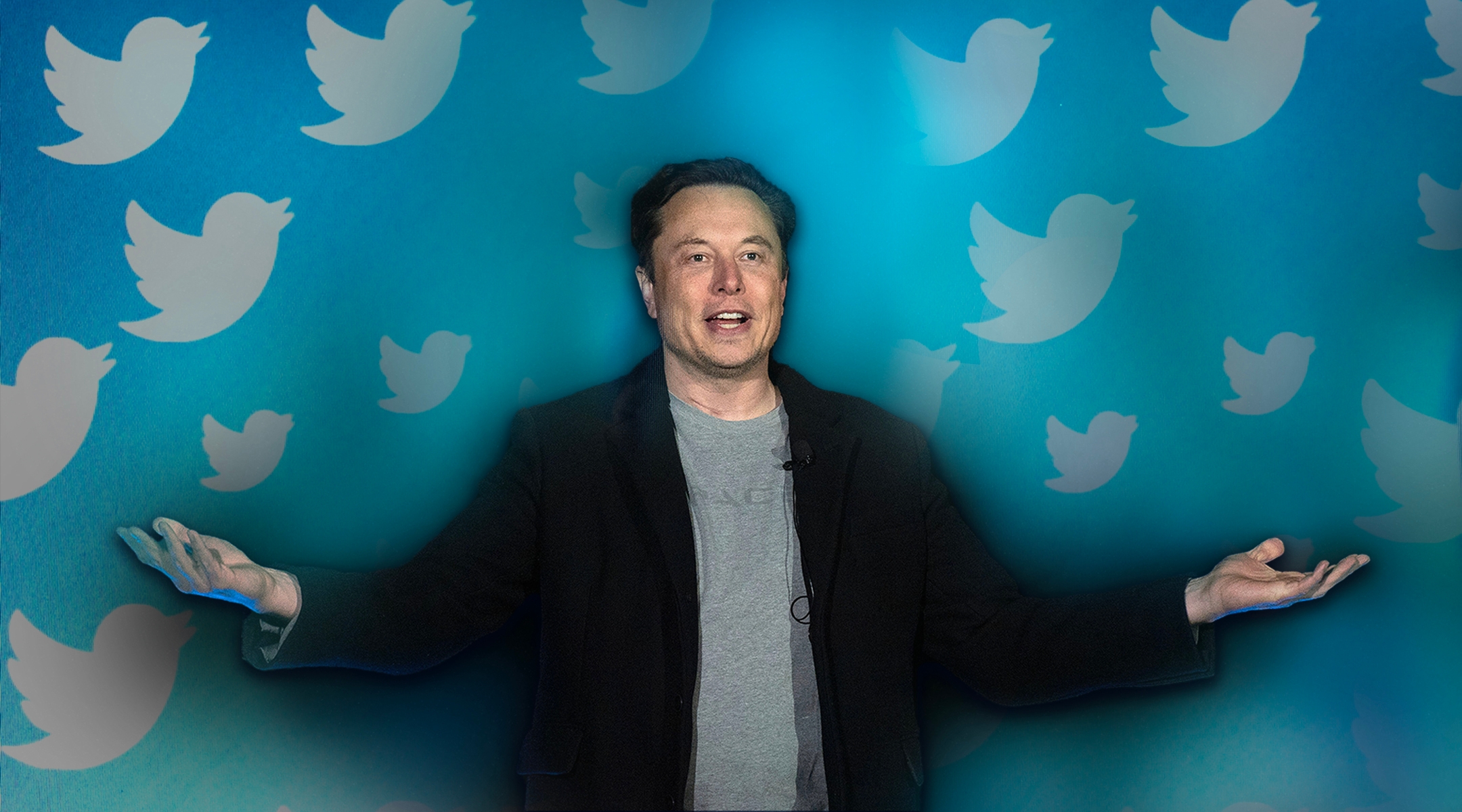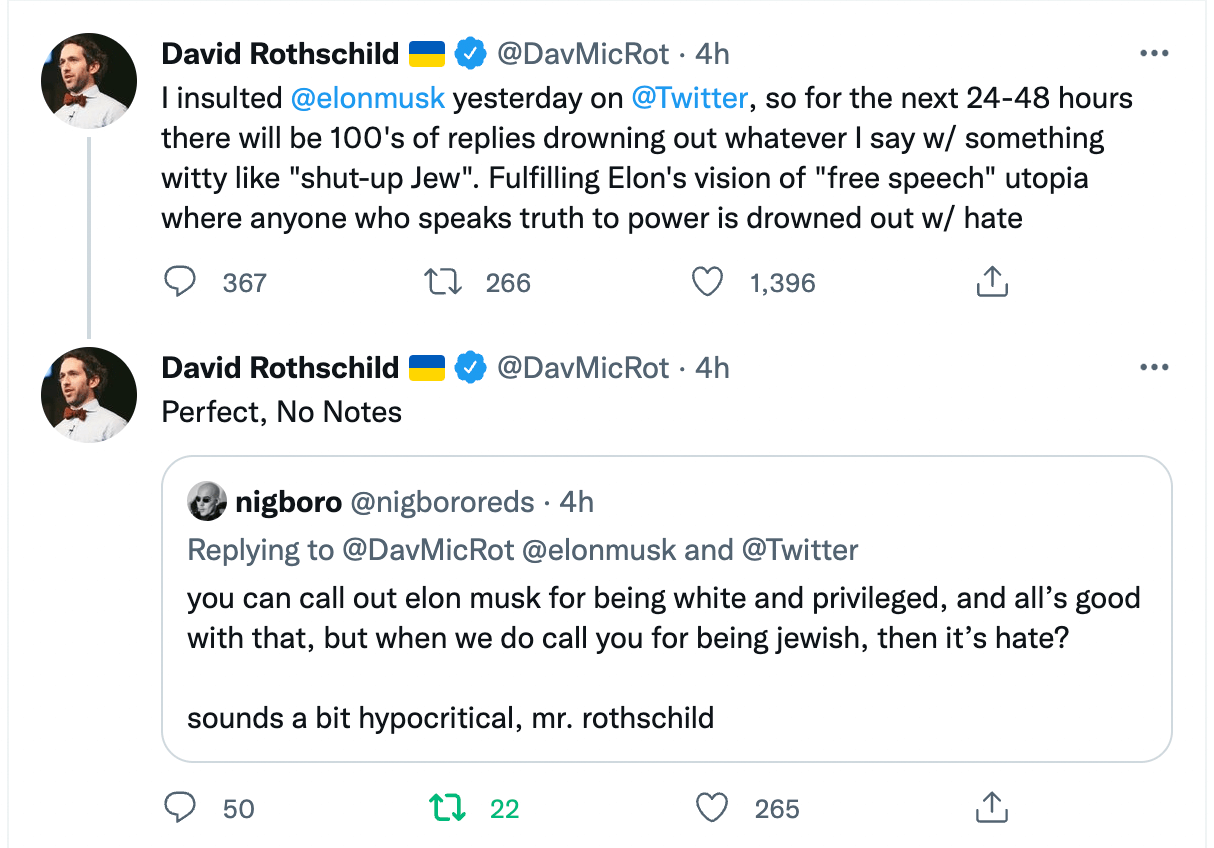Conspiracy theories about the Rothschilds are still going strong on Twitter
After David Rothschild —no relation to the banking family — clapped back at an Elon Musk tweet, things quickly devolved into antisemitic conspiracies.

Tesla CEO Elon Musk has enough Twitter followers to make anything go viral. Photo by iStock
Once again, the Rothschilds are trending. This time, it’s not because Marjorie Taylor Greene said they had space lasers, but because an economist named David Rothschild — who has nearly 100,000 followers on Twitter — responded to an Elon Musk tweet complaining about the Democratic party, calling out Musk’s privilege as the white son of a South African emerald miner.
Instantly, commenters jumped on Rothschild’s last name, pointing out the irony of a Rothschild criticizing someone else’s privilege given the family’s banking business and wealth. “A Rothschild complaining about other people’s privileges. The joke tells itself,” read one reply. “Bro you’re one of the most privelaged [sic] people to have ever lived, this is silly. At least Elon is making the world a better place,” said another, boasting thousands of likes.
Except David Michael Rothschild the economist says he has no relationship to the banking family. There is a David Rothschild — David Mayer de Rothschild — who is part of the banking family; he is an explorer, not an economist. Of course, even if a member of the banking family were criticizing Musk, it wouldn’t invalidate the criticism and, given that Musk is one of the wealthiest people in the world, any Rothschild’s fortune would be dwarfed by his.
But those sorts of facts are irrelevant to the conspiracy theories that swirl around the Rothschild name — those who disseminate these theories aren’t really concerned with the Rothschild banking family, who, while wealthy, are far less wealthy than numerous other institutions and individuals. Instead, talking about the Rothschilds’ serves as a shorthand for a larger network of antisemitic tropes about Jews controlling wealth and power. And since David Rothschild’s viral clapback at Musk, those conspiracies are swirling anew, boosted to a wider audience thanks to the visibility of anything Musk tweets.
Though numerous people in the replies to Rothschild The Economist’s tweet tried to point out that multiple people can have the same last name and not be related, the conspiracy theorists shrugged this off, simply reasserting that any Rothschild is part of the banking family and is fundamentally evil. Anyone trying to defend this Rothschild was mocked in the comments.
The viral moment has elevated numerous memes and conspiracy theories about the Rothschilds and, by extension, the canard of a Jewish cabal trying to control the world, including versions of the Great Replacement theory recently thrust into the spotlight by the Buffalo shooter. A picture of a patent is circulating, and supposedly proves that the Rothschild family caused the coronavirus pandemic in order to profit off of medical inventions; the document is actually a standard patent application for a COVID-19 test. (This conspiracy is an extension of an existing accusation that the Rothschilds caused the Spanish Flu.)
Others tweets replying to Musk and Rothschild repeat better known conspiracies, such as the one that holds that the Jewish Rothschild family financed the Nazis and that they control nearly every major banking institution. The conspiracies are attached to memes with dramatic red lettering and sinister-looking pictures of Rothschild family members.
In a way, the Rothschild conspiracy theory feels old-fashioned — today, the Rothschild family is not a cultural behemoth outside of conspiracy circles, and the financial institution is much smaller than larger institutions such as Deutsche Bank.
But in moments like these, it’s clear that the Rothschild conspiracy has persisted — in fact, thanks to a greater distance from the historical origin of the theory, it has flourished. Freed entirely from the facts and released to a rabid, fast-moving online culture with no time for research and the ability to disseminate ideas widely, it’s been able to develop even further.

When major public figures such as Elon Musk, one of the most-followed Twitter users out there, get embroiled in a debate like this, conspiracy theorists are able to ride the coattails of the issue into greater publicity. And as people pile on to the viral moment, the conspiracy theories morph and distort even more.
The modern political milieu online has enabled people to further justify their antisemitic beliefs, attempting to turn progressive ideas about privilege back on their users. After Rothschild The Economist tweeted about the antisemitic attacks he was receiving after he criticized Musk, replies tried to invalidate his statement by saying that criticizing or hating Jews as a group is no more racist than criticizing privileged wealthy people. Combining this with the Rothschild’s wealth creates a group that, conspiracy theorists argue, is not only legitimate but mandatory to criticize — by the progressive left’s own logic.
This is, of course, silly; criticizing how people wield their wealth and power is not the same as criticizing an entire ethnic group — the latter is racist. But once you’ve bought into the rhetoric of online conspiracies, it’s nearly impossible to see the difference. And that makes the Rothschilds the perfect target — even when the guy being targeted isn’t even one of them.
















